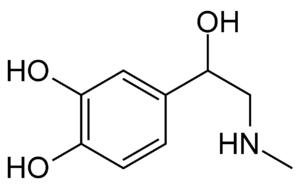Epinephrine facts for kids
Epinephrine, also called adrenaline, is a special chemical in your body. It acts as both a hormone and a medication. The names "adrenaline" and "epinephrine" come from old Latin and Greek words. Both names mean "onto the kidney". This is because adrenaline is made in your adrenal glands, which sit right on top of your kidneys. Doctors often shorten the name to "epi" (pronounced eh-pee).
Contents
History of Epinephrine
A Japanese chemist named Jokichi Takamine was the first to get this hormone in a pure form. This happened in 1901. It was later given a patent in the United States under the name "adrenaline."
How Epinephrine Affects Your Body
Epinephrine is one of the main chemical messengers that control your sympathetic nervous system. This system helps your body get ready for danger. It causes what is known as the "fight or flight" response. When epinephrine kicks in, it makes many changes happen quickly throughout your body. For example, it:
- Makes your heart beat much faster.
- Increases your blood pressure.
- Causes vasoconstriction. This means it makes your blood vessels narrower. This sends extra blood to your most important organs, like your heart, lungs, and brain.
- Causes bronchodilation. This means it makes the tubes that bring air to your lungs, called bronchi, get wider. This allows more air to get into your lungs.
Side Effects of Epinephrine
Because epinephrine causes so many changes, it can sometimes make a person feel unwell. In some cases, these changes can even be dangerous. These are called adverse effects or side effects. They can include:
- Tachycardia or palpitations. This is when your heart rate is very fast, or you feel your heart pounding. This happens because epinephrine makes your heart work harder and faster.
- Hypertension. This means high blood pressure. Epinephrine naturally raises blood pressure.
- Cardiac arrhythmia. This is when your heart beats in a way that is not normal.
- Feeling very anxious or having a panic attack.
- Tremor, which is a shaking feeling.
- Acute pulmonary edema. This means there is fluid in your lungs.
Medical Uses of Epinephrine
Epinephrine is a very important medicine. It is used to treat several serious medical problems.
For a Stopped Heart
Epinephrine can help restart a person's heart if it has stopped beating. This condition is called cardiac arrest. The medicine can make the heart start pumping blood to the rest of the body again.
For Severe Allergies
Epinephrine is the best medicine to treat anaphylaxis. This is a very serious allergic reaction. During anaphylaxis, the bronchi (the tubes that bring air to the lungs) can get very narrow. This makes it hard or impossible for the person to breathe. Epinephrine makes these tubes get wider again, so air can get into the lungs. It also helps with other symptoms of anaphylaxis.
People with serious allergies can get a special device called an epinephrine "auto-injector." A doctor can give them a prescription for it. Anyone can learn how to use an auto-injector. If someone starts having anaphylaxis, they just press the auto-injector against their outer thigh. The device will automatically inject the correct amount of epinephrine into their leg.
For Asthma Attacks
Epinephrine can be given for bad asthma attacks. This is usually done if regular asthma medicines, like albuterol, do not work well enough. The epinephrine helps relax the muscles around the lungs. This widens the bronchi, making it much easier to breathe.
For Croup
Croup is a sickness that mostly affects children. It is caused by a virus. Croup can make the throat swell up, which makes it hard to breathe. Epinephrine can help bring this swelling down. This makes it easier for the child to breathe. For croup, epinephrine works best when it is breathed in. So, it is made into a special mist that children can inhale.
Related pages
See also
 In Spanish: Adrenalina para niños
In Spanish: Adrenalina para niños
 | John T. Biggers |
 | Thomas Blackshear |
 | Mark Bradford |
 | Beverly Buchanan |


